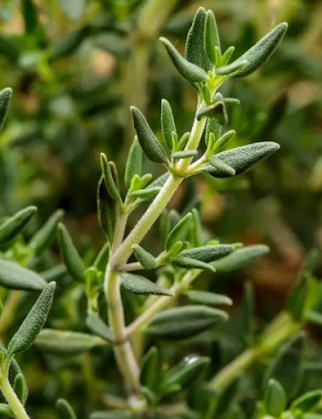Thyme has been used historically for cosmetic, culinary, medicinal purposes and even presumed magical qualities. It is thought that the ancient Sumerians were the first to grow thyme, perhaps as long as 5,000 years ago. The Sumerians recognized its minty-clove aroma as a hint to its potential for medicinal purposes.
The ancient Egyptians used thyme as an embalming fluid. In ancient Greece, they used thyme as an incense in temples and added it to bathwater. The Egyptians also used thyme as a pain reliever, and it was included in many of their medicines.
Thyme’s use as a curative was continued by the Ancient Greeks and Romans. The Greeks used sprigs of thyme as a preservative for fruit and wine, and drank tinctures of thyme to ward off nightmares.
The name Thyme, in its Greek form, was first given to the plant by the Greeks as a derivative of a word which meant ‘to fumigate,’ either because they used it as incense, for its balsamic odour, or because it was taken as a type of all sweet-smelling herbs. It also may come from the Greek word thymon, meaning courage.
Romans burnt thyme to deter dangerous animals, and used thyme to flavor cheese and alcoholic beverages. The Romans thought that eating thyme before or during a meal would cure poisons, making it especially popular among Roman emperors. Roman soldiers bathed in thyme, as this was believed to provide vigor. They are also offered it as a cure people for who were melancholic or shy.
Hippocrates, who lived around 460 BC to 370 BC and is known today as “the father of Western medicine,” recommended thyme for respiratory diseases and conditions.
In the European Middle Ages, the herb was placed beneath pillows to aid sleep and ward off nightmares. In this period, women would also often give knights and warriors gifts that included thyme leaves as it was believed to bring courage to the bearer.
When the Black Death hit, thyme was used in so many medicines as a treatment. In the Victorian Era, nurses would often bandage wounds with a thyme solution.
In modern times, thyme oil is commonly used in manufacturing as a constituent of soaps, cosmetics, mouthwash and toothpaste. Red thyme oil is used in perfumes.
History of Thyme (Thymus vulgaris L.)
The Evolution of Modern Food Flavor
-
The evolution of modern food flavor is a story shaped by scientific
curiosity, technological progress, and the growing demands of an
industrialized world. ...



